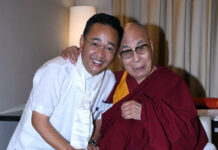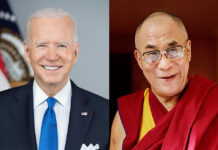
(TibetanReview.net, Jul31’20) – The Dalai Lama has expressed condolences on the passing away on Jul 30 of the man who steered Taiwan towards democracy and became its first popularly elected President in 1996. He has called Lee Teng-hui a personal friend whom he first met in 1997 and on several occasions later on. China vent spleen on Lee and Taiwan on the news of his death.
In his message to the 97-year-old’s widow, Mrs Tseng Wen-hui, and family, the Dalai Lama has said, “His contribution to Taiwan’s democratic development was an exceptional achievement. Today, Taiwan is a vibrant and prosperous democracy with a rich cultural heritage. Perhaps the best tribute we can pay him is to remember his courage and determination and emulate his dedication to democracy.”
The Dalai Lama’s visit to Taiwan in 1997 was his first and it paved the way for several more subsequent visits, the opening of an exile Tibetan administration mission in Taipei, and the eventual dissolution of the Mongolian and Tibetan Affair Commission, a cabinet-level body which was notorious for funding disgruntled elements and troublemakers in the exile Tibetan community.
Lee had wanted the international community to treat Taiwan as a sovereign, independent country in the face of China’s determined drive to eventually annex it.
China’s spokesperson for the Taiwan Affairs Office of the State Council has reacted to the news of his death on Jul 30 by calling “Taiwan independence” a dead-end road. The historical trend of national reunification and rejuvenation cannot be stopped by anyone or any force, the official Xinhua news agency Jul 31 quoted Zhu Fenglian as saying.
And China’s party-run globaltimes.cn Jul 31 maintained that Lee will not be remembered fondly in Chinese history.
Lee was credited with paving the way for Taiwan to become a modern, free society after decades of one-party dictatorship and became a champion of the island’s bid to be treated as a sovereign state internationally. His 12 years in office from 1988 to 2000 were marked by growing cross-strait tensions as he pitched himself against Beijing, infuriating Chinese authorities for daring to carve out a separate identity for Taiwan, noted an AFP commentary Jul 30.
Lee was born in Taiwan in 1923 and educated in Japan, which ruled the island as a colony for 50 years until 1945, when it lost the Pacific War. Taiwan was then handed back to China, which was under the rule of Nationalist Kuomintang (KMT) leader Chiang Kai-shek. But after Chiang lost a civil war to communist forces on the mainland four years later, he fled to Taiwan to set up a rival government. Ruling with an iron fist, he instigated a “White Terror” purge of opponents which lasted until his death in 1975.
Martial law was lifted by the younger Chiang in 1987. However, it was Lee, vice president since 1984, who drove forward Taiwan’s largely peaceful transition into a fully functional democracy, including a direct vote for president.
In 1996, China fired ballistic missiles into the Taiwan Strait in an unsuccessful bid to stop voters from electing Lee as President, prompting the US to send warships to the area.
Lee had been ill for some while and died in Taipei Veterans General Hospital.





